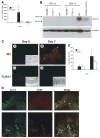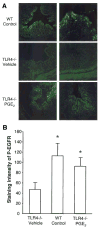Cox-2 is regulated by Toll-like receptor-4 (TLR4) signaling: Role in proliferation and apoptosis in the intestine
- PMID: 16952555
- PMCID: PMC2169292
- DOI: 10.1053/j.gastro.2006.06.017
Cox-2 is regulated by Toll-like receptor-4 (TLR4) signaling: Role in proliferation and apoptosis in the intestine
Abstract
Background & aims: We recently showed that mice deficient in Toll-like receptor 4 (TLR4) or its adapter molecule MyD88 have increased signs of colitis compared with wild-type (WT) mice after dextran sodium sulfate (DSS)-induced injury. We wished to test the hypothesis that cyclooxygenase 2 (Cox-2)-derived prostaglandin E2 (PGE2) is important in TLR4-related mucosal repair.
Methods: Cox-2 expression was analyzed by real-time polymerase chain reaction, immunohistochemistry, Western blotting, and luciferase reporter constructs. Small interfering RNA was used to inhibit expression of MyD88. TLR4-/- or WT mice were given 2.5% DSS for 7 days. Proliferation and apoptosis were assessed using bromodeoxyuridine staining and terminal deoxynucleotidyl transferase-mediated deoxyuridine triphosphate nick-end labeling assays, respectively. PGE2 was given orally to DSS-treated mice.
Results: Intestinal epithelial cell lines up-regulated Cox-2 expression in a TLR4- and MyD88-dependent fashion. Lipopolysaccharide-mediated stimulation of PGE2 production was blocked by a selective Cox-2 inhibitor or small interfering RNA against MyD88. After DSS injury, Cox-2 expression increased only in WT mice. TLR4-/- mice have significantly reduced proliferation and increased apoptosis after DSS injury compared with WT mice. PGE2 supplementation of TLR4-/- mice resulted in improvement in clinical signs of colitis and restoration of proliferation and apoptosis to WT values. The mechanism for improved epithelial repair may be through PGE2-dependent activation of the epidermal growth factor receptor.
Conclusions: We describe an important link between TLR4 signaling and Cox-2 expression in the gut. TLR4 and MyD88 signaling are required for optimal proliferation and protection against apoptosis in the injured intestine. Although TLR4 signaling is beneficial in the short term, chronic signaling through TLR4 may lower the threshold for colitis-associated cancer.
Figures







References
-
- Hooper LV, Stappenbeck TS, Hong CV, Gordon JI. Angiogenins: a new class of microbicidal proteins involved in innate immunity. Nature Immunology. 2003;4:269–73. - PubMed
-
- Abrams GD, Bauer H, Sprinz H. Influence of the normal flora on mucosal morphology and cellular renewal in the ileum. A comparison of germ-free and conventional mice. Lab Invest. 1963;12:355–64. - PubMed
-
- Kitajima S, Morimoto M, Sagara E, Shimizu C, Ikeda Y. Dextran sodium sulfate-induced colitis in germ-free IQI/Jic mice. Experimental Animals. 2001;50:387–95. - PubMed
-
- Sartor RB. Clinical Applications of Advances in the Genetics of IBD. Reviews in Gastroenterological Disorders. 2003;3:S9–S17. - PubMed
Publication types
MeSH terms
Substances
Grants and funding
LinkOut - more resources
Full Text Sources
Other Literature Sources
Medical
Research Materials

